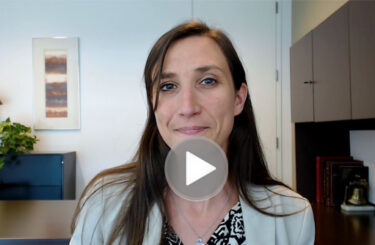What is Probate?
By Ashley L. Hawley
July 29, 2021
Attorney Ashley Hawley walks viewers through what’s involved in the probate process in her latest video.
Video Transcript:
Hi, I’m Ashley Hawley. I’m an attorney at Ruder Ware in the Trust & Estates Department. Let’s talk probate. Probate is the core process of transferring assets out of a deceased individual’s name and into the names of the beneficiaries. So, if I have a will though, that avoids probate, right? Sorry, it doesn’t work like that. If you have a will, what a will does for you is it describes where you want your assets to go when you pass away and also who gets to be in charge of making that distribution, but it does not avoid probate. In Wisconsin, if you have assets of greater than $50,000, and those assets don’t have a beneficiary designation, or have joint ownership with somebody else, or you don’t have some other non-probate transfer (like a transfer to a revocable trust, for example), then those assets will have to go through probate. So generally speaking, in a nutshell, the probate process starts with the will being filed, if there is a will. A personal representative being appointed to administer the estate, and then the the court sets certain deadlines that that personal representative has to meet. There is a deadline to publish in the newspaper, a deadline for creditors to come forward. There is a deadline for providing an inventory, or a list of the assets as of the date of death. And then, the personal representative has to actually administer the estate – pay the expenses and make sure that all the administrative costs are taken care of, and then, at the end of the process, distribute the assets to the beneficiaries. There’s some accounting that is due that describes what happens through the process, there’s also receipts, and a couple of other closing documents that need to be filed. Typically, there is also a tax return that the estate would file showing the income that is received. And then, at the very end of the process, everything gets filed with the courts and the court closes the probate proceeding. So in a nutshell, that’s what probate is. In later posts, we will describe some more pros and cons of going through probate. Some people decide they want to go through probate, other people will make the decision that it’s better to avoid that process. So, it’s really up to you and your unique situation. If you want to learn more now, or if you want to talk with somebody about your situation, I encourage you to reach out to a team member here at Ruder Ware.
Back to all News & Insights
Disclaimer
The content in the following blog posts is based upon the state of the law at the time of its original publication. As legal developments change quickly, the content in these blog posts may not remain accurate as laws change over time. None of the information contained in these publications is intended as legal advice or opinion relative to specific matters, facts, situations, or issues. You should not act upon the information in these blog posts without discussing your specific situation with legal counsel.
© 2024 Ruder Ware, L.L.S.C. Accurate reproduction with acknowledgment granted. All rights reserved.

